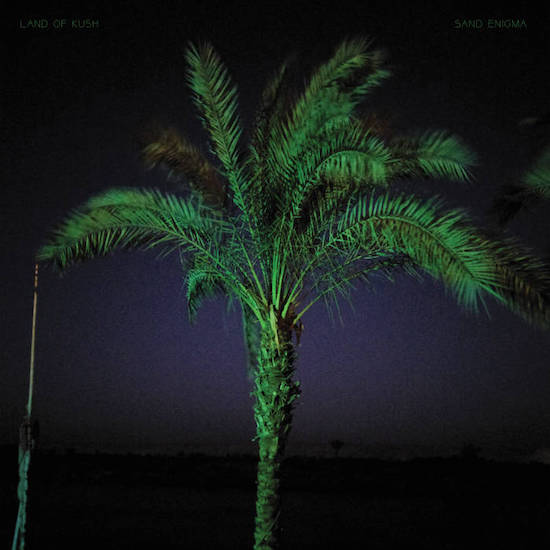The Egyptian/Canadian composer, Sam Shalabi, must be a busy man. In between releasing albums under the Shalabi Effect moniker, comprising one third of The Dwarfs Of East Agouza (alongside Alan Bishop and Maurice Louca), appearing on the new Matana Roberts album, and working on his sixth solo record, he still finds time for a fourth entry in his most ambitious project, Land Of Kush. Having previously released an album influenced by Thomas Pynchon’s vast novel, Against The Day, in 2009 and another inspired by Cario itself, The Big Mango in 2013, Land Of Kush return with their best record to date.
A 20-piece plus ensemble featuring an incredible diversity of instrumentation, Land Of Kush exist at the opposite end of the musical spectrum to The Dwarfs Of East Agouza’s infectiously funky, mechanical loops. A fertile collision between the Montreal Mile End art-rock improv scene and the large ensemble works of Egyptian big band composers, with some rock, noise and free jazz flavours thrown into the mix, Sand Enigma has an ‘everything including the kitchen sink approach’. At times it’s as though one is tuning in to a radio where the dial is intermittently shifting, and whilst not all of it is entirely successful, there are some incredible moments of beauty and rapture to be found here, as well as some passages that might well startle your neighbours or frighten your cat.
Bleeding into one another and gathering momentum as they go, Sand Enigma’s first three tracks represent the strongest beginning to an album I’ve personally heard this year. ‘Aha’ is a dreamy, diaphanous cloud of strings, sax and the wondrous voice of Nadah El Shazly. Multiple voices susurrate at the edges of audibility, creating a subtle edge of dissonance, turning into animal-like howls and screeches, as the percussion picks up speed and the sound of an orchestra swells in the background. Emerging from that maelstrom, ‘Domyat 1331’ opens up with a more spacious sound, albeit one with an electronic pulse pinging in the distance like an alarm clock in another room. Jason Sharpe’s warm baritone saxophone sound occupies the centre of the track, until it’s overcome by a chorus of wailing voices and begins to refract the chaos back. As the clamouring voices dissipate, the seductive groove of ‘Safe Space’ begins. One of several stand out tracks, it sounds initially as though it might be a relatively straightforward rhythmic number with the allure of the ballroom jazz dancefloor, but soon wrong-foots the listener with a generous sprinkling of dissonance that recalls the weird, operatic art-rock of obscure 80s LA band The Fibonaccis, especially the vocals of their Korean singer Magie Song. A swarm of electronically tweaked sounds erupts from ‘Broken Maqams’, which eventually settles down into a more traditional version of the maqam form, if not for long.
When I was first listening to this album, my wife accused me of listening to more than one piece of music simultaneously from the adjacent room where she was stationed, trying to work. I could see her point, as there are parts of this album that sound exactly like that.
Title track, ‘Sand Enigma’, is almost Sun Ra-like in its deployment of a cool jazz refrain against frenetically tinkling piano keys. The disorienting babble and crazed scat-singing of ‘Ssssss’ is the album’s most experimental (and least feline friendly) moment. But even here, the preceding chaos gives way to gentle, John Fahey-like guitar at its end, as if to further emphasise the surprise element in colliding such dissimilar sounds. The Popol Vuh like use of church organ sound and gorgeous vocal courtesy of Katie Moore, make ‘Recuerdo’ one of the album’s greatest (and simplest) pleasures. ‘Ana’ is like a strange music box melody the protagonist of a fantasy film might discover in a dusty attic. ‘Trema’ reverts to a less experimentally framed vision of Egyptian music but still retains an intoxicating strangeness and an infectious beat. ‘Dol’ is considerably harder on the ears, with squalls of scraped strings, which nevertheless somehow sets the table perfectly for the album’s end. ‘Tensor’ is a slow building, percolating sax set against a drone recalling the ‘swarm of angry bees’ sound of the Master Musicians of Joujouka, the drone drawing out almost to the point of exhaustion for the listener.
Although taken in one sitting, it can be a little wearing even for those predisposed to liking such challenging sounds, Sand Enigma is a work of enormous ambition with many incredible highs, and just a few bewildering ‘lows’. In blurring the line between traditional and contemporary, as well as the distinctions between musical genres not usually known to keep company, Sam Shalabi has delivered a modern psychedelic masterpiece with ancient overtones.


